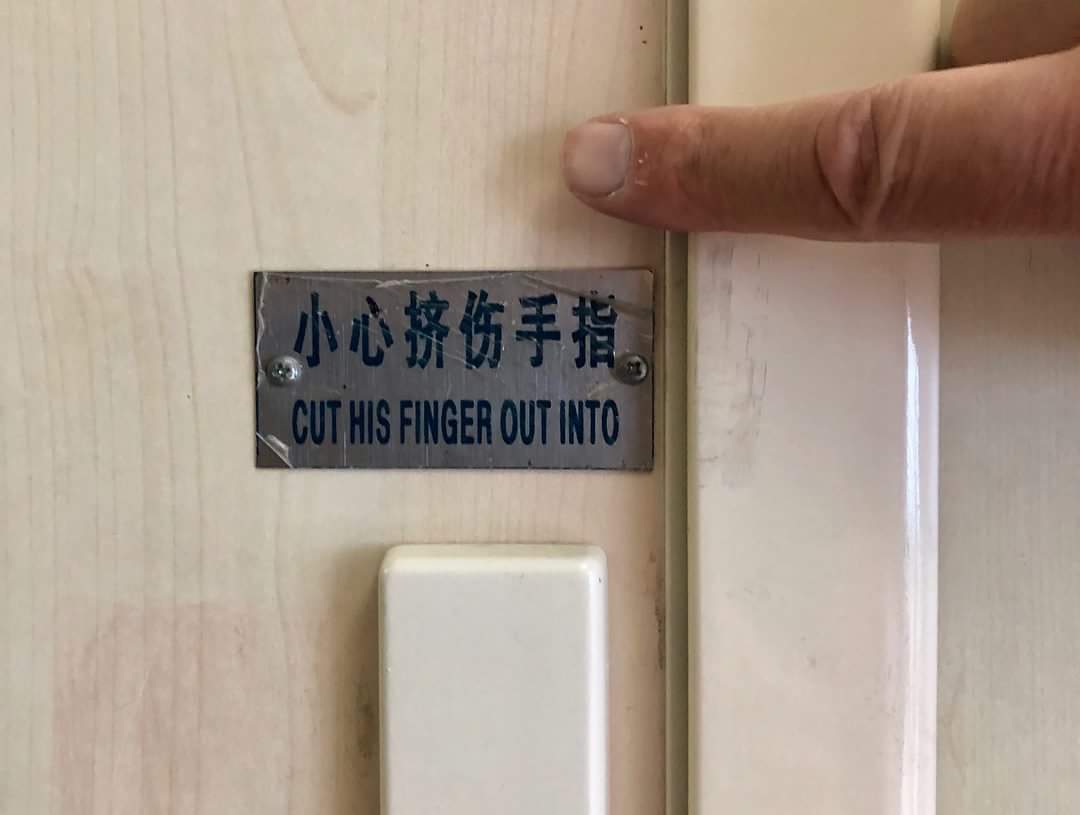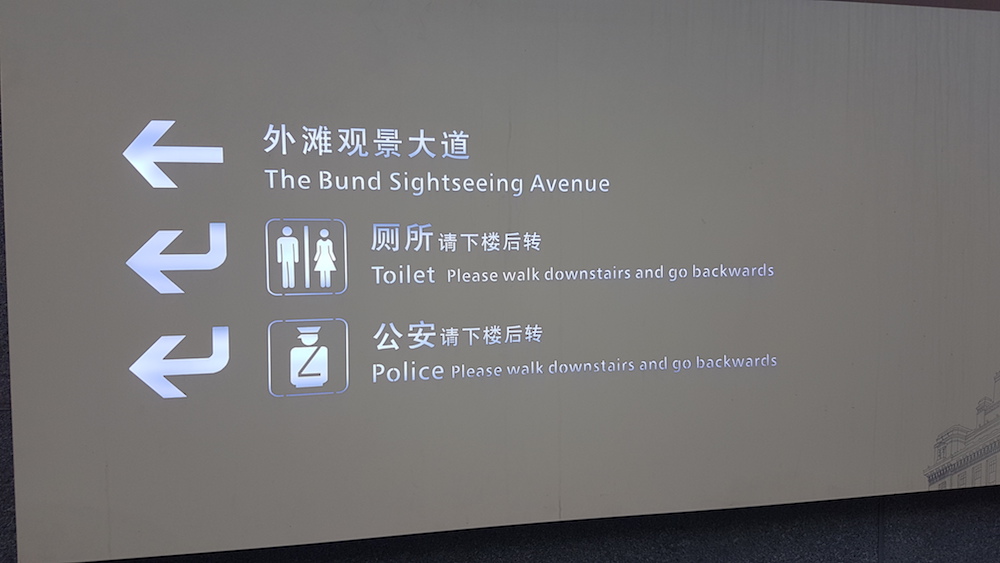Cut his finger out into
« previous post | next post »
Further brilliant discoveries of Chinglish by Harry Asche, who several weeks ago sent us the dashboard prayer wheel featured in "Spiritual high tech" (7/14/18):
I.
Xiǎoxīn jǐshāng shǒuzhǐ
小心挤伤手指
"Be careful [not] to injure your fingers by getting them squeezed / crushed"
Google Translate: "Carefully squeeze your fingers"
Baidu Fanyi: "Take care of your fingers"
Bing / Microsoft Translator: "Be careful to squeeze your fingers"
This formulation gets 158 hits on Google.
The following slight rewording scores 1,110 ghits:
Xiǎoxīn jiāshāng shǒuzhǐ
小心夹伤手指
"Be careful [not] to injure your fingers by getting them caught / jammed"
Google Translate: "Be careful to pinch your fingers"
Baidu Fanyi: "Be careful with your fingers"
Bing / Microsoft Translator: "Watch your fingers"
II.
To get to the toilet and the police, you go downstairs and turn toward the back (hòu zhuǎn 后转). You don't have to walk backwards to get there.
III.
Shànghǎi shēng jiān bāo
上海生煎包
(a Shanghai special snack that consists of an iron-pan seared bun with a juicy meatball stuffed inside)
zhuānmài
专卖
(usually means "monopoly", but here it indicates that the shop is dedicated to this type of bun)
The delights of Chinglish are endless, and it is so nice to catch them in the wild.
[Thanks to Yixue Yang]



Kovács Péter said,
July 20, 2018 @ 3:44 pm
Unfortunately I don't speak Chinese and can't read the simplified kanjis, so I can't comment on how much the English translation matches the original, but the phrasing "Please walk downstairs and go backwards" is 95% clear to me, if a bit odd. I don't understand it as "walk backwards", as in, getting closer to my destination while having my back to turned to my destination, but parse it as "turn around and go forward". (The "walk downstairs" phrase is, on second reading, odd though.)
English-as-second-language speaker since ~20 years ago.
GretchenJoanna said,
July 20, 2018 @ 6:10 pm
I can't stop laughing – and each one seemed funnier than the previous.
Victor Mair said,
July 20, 2018 @ 8:53 pm
walk backwards
go backwards
Harry said,
July 20, 2018 @ 10:01 pm
I'm not sure whether the Goon Show was popular in the US. It was rebroadcast on Australian radio until quite recently.
The meaning of the "go backwards" sign was not difficult, but it got me singing "I'm walking backwards for Christmas" as I walked the streets of Shanghai. This was a 45rpm record with "The Ying Tong song" on the flip side.
Jacob said,
July 21, 2018 @ 9:34 am
My favorite of all time: https://bit.ly/2zWAyXk
I saw this once at the koi feeding area of a public park but did not take a picture. The picture was the first thing that came up in a google search, so it must have been used at a number of parks.
Yánjìn yòng zì dài shíwù wèi yú
严禁用自带食物喂鱼
"Do not/it is forbidden to use your own food to feed the fish".
B.Ma said,
July 22, 2018 @ 2:58 am
I agree with Kovács Péter, I don't see any problem with "go backwards", which is not the same as "walk backwards". The sign doesn't tell you to walk backwards.
Victor Mair said,
July 22, 2018 @ 6:09 am
Interesting. Must be a matter of individual or regional preference. For myself and the people I asked about it, of the four options below, only the latter two would mean hòu zhuǎn 后转.
"go backwards"
"go backward"
"go toward the back"
"go towards the back"
BZ said,
July 23, 2018 @ 2:34 pm
"Go backwards" is perhaps a bit odd, but easily understood in context. What bothers me is I see now non-awkward way to say this. "Go (or turn) towards the back" doesn't really mean the same thing ("the back" to me is a defined area, not a direction). "Turn around and go forward" does mean what we want it to, but is clunky. "Turn around" by itself is ok, assuming it's either right there or there are additional directions once you turn around. Then again, none of these versions tell you how far to "go backwards" anyway, so additional directions are a must anyway.
Ricardo said,
July 24, 2018 @ 5:30 am
I thought 垄断 means 'monopoly'. I have only ever seen 专卖 used in the sense in which the 上海生煎包店 uses it i.e. implying exclusivity.